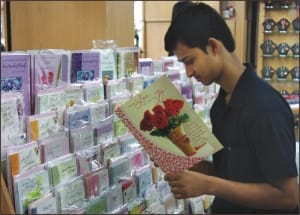Tech alters ways of greeting

A shopper checks a greetings card at an outlet of Hallmark in Dhaka yesterday. Photo: Amran Hossain
In the era of booming mobile phone technology, it has now become a matter of debate whether your way of wishing by paper card to someone special was better before than now. Some prefer short messages from a handy device to paper-card greetings.
But when a leading mobile operator says its network disrupts during any festival period due to doubling SMS volume mainly because of customers' intention to greet their loved ones, it does make sense.
It means technology changes lifestyle.
Sending simple slips of paper greetings cards to wish one another are now the thing of the past. Though traditional paper card greetings are tangible and give scope to personalise it, e-card and short message service (SMS) are taking over the trend.
It could have happened little bit unconsciously. Your hand frequently moves to mobile or computer keyboard during any festival time to greet social circles that you belong.
Airing feelings has been in practice since 1997 in Bangladesh, when Grameenphone launched SMS for the first time. Subsequently, the thumb device had become more popular, especially among the teens accustomed to greeting their vast social circle in any festival.
Mobile phone industry insiders estimated that 44 million customers of six mobile operators generate around 15 million SMS every day.
So, it happens what it should be. Despatch of greetings by e-mail and mobile phone has reduced the business of paper cards by almost 50 percent.
"Average sales of paper cards have dropped 50 percent in a span of few years and it is because of the emergence of mobile phone and internet technology," said Ziauddin Ahmed Kawsar, the proprietor of Archies Gallery at Hatirpool.
During the recent Friendship Day, his shop's paper card sales dropped significantly, he pointed out. "I bought friendship cards worth Tk 40,000. Of those, cards worth Tk 10,000 were not sold."
Sitting just on his opposite location, Md Zakir Hossain, the proprietor of Hallmark, another popular gift shop, said easy access to advanced technology changes the way of greetings.
In the recent past, people used to prepare lists of friends, relatives and others for sending festival cards like Eid. The selection of the cards varies in accordance of the nature of relationship.
But now, people do not have time to buy a card and go to post office to post it. They like to send SMS containing texts, pictures or animation to greet their relatives and friends.
"Text messages have become a very popular medium of sending and receiving greetings on special days like Eid, New Year and other holidays. The volume of text messages more than doubles during special occasions like Eid," said Syed Yamin Bakht, director (public relations) of Grameenphone, the leading mobile phone operator having 20.84million customers.
The second mobile market leader Banglalink officials said usually it handles 5.5 million SMS a day and the volume during festival time, especially Eid, increased to 12.5 million per day.
The internet users in Bangladesh largely use internet greetings sites such as eidmubarak.com or eidgreetings.com. Users can wish their near and dear ones by these sites for free.
"I used to send e-card to my friends on any occasion like friendship day or Eid," said Tania Hossain, a second year student of BRAC University.
She, however, said, "To me paper card is very special because of its physical existence." "It can be stored as archive of feelings, whereas SMS does not have that flavour."
Besides SMS, mobile operators also provide internet facilities through which customers also send greetings. The local value added service providers are now passing busy days to give Eid greeting services to the mobile operators.
Citing the example of 'GP World' service, Md Sharif Uddin, technical director of Inforev Limited, a local content provider, said, "We are providing an exclusive service to Grameenphone. Grameen's internet users can wish their dear ones by sending e-card from GP World web page."
However, despite having dynamic feature of SMS or e-card, paper card might be sustained in a sense of exclusivity, paper card traders say confidently. Although paper card sales dropped, sales of occasional gift have increased.
Hallmark proprietor Hossain said the new generation is yet to give up the traditional practice of presenting something special to loved ones. "If you calculate the total sales of our 70 outlets across the country, it has so far been satisfactory."
He said the teenage groups are willing to celebrate any occasion, from Friendship Day, birthday to Valentine's Day. So the options are many for celebration here and demand for paper cards also gains momentum, Hossain went on.
On the other hand, the corporate sector still relies on printed cards for greetings. During the mega festival like Eid, corporate houses order for a significant number of cards, which also helps retain the usage of paper cards.
Even from software entrepreneurs, paper cards still get goodwill value. "I personally prefer paper cards because of its intangible feature and exclusivity as well," said Habibullah N Karim, president of Bangladesh Association of Software and Information Services (BASIS).
"When I see someone unknown wishing me through e-card, it does not create extra feelings for me," said the software maker. "I think it comes as I am in the sender's mailing lists. But when an anonymous paper card comes to my office, or home, it is a bit lucrative to me and I used to open it.”

 For all latest news, follow The Daily Star's Google News channel.
For all latest news, follow The Daily Star's Google News channel. 



Comments